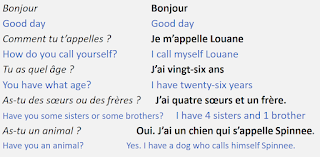There's lots to fill you in on with how I'm doing rewriting our booklets - although the really interesting part will come when we see how they go down in the classroom. Meanwhile, I need to do an update on the GCHQ challenge our International Leaders did with Year 8.
I was wondering if GCHQ were going to produce materials to promote languages. I know they have done spectacular Cyber Challenges and Competitions in the past. As languages is part of their core activity, I would have expected them to be leading the way in promoting languages in schools and their usefulness for the UK. I have heard that they are going to be launching a national languages competition sometime soon. So I very much look forward to that. Meanwhile they have these school activities on their website.
The activity takes the form of a scenario: You are listening to intercepted conversations with members of an organised criminal gang. GCHQ identify and exemplify 4 different features of their work: decoding encrypted messages; language skills; cultural references; "veiled" or opaqe use of language. The scenario requires all four of these activities.
Our Year 9 International Leaders tried out the materials and decided the "Year 11" ones would be best for our Year 8s. It was done as a Tutor Time challenge, with pairs of International Leaders going to each form for 2 twenty minute sessions.
They gave a brief introduction to GCHQ as the UK's intelligence gathering organisation and talked briefly about careers there - there are further videos on the GCHQ website if teachers want to follow up with these. Then they gave out the resources for pupils to tackle the scenario. First a simple substitution cypher to decode encrypted words. Then work with dictionaries to translate the French. This went better than expected, with Year 8 pupils well able to look for the overall meaning of the sentence rather than getting bogged down looking up words like "sont" or being frustrated by not finding feminine forms of adjectives in the dictionary. I think this was down to expert help from the Year 9 International Leaders.
The "veiled" language was not a problem for pupils who had paid attention to the instructions, where it was spelled out that the criminals often used names of fruit to refer to drugs. Perhaps the criminals stole this idea from a previous generation of French teaching resources,- didn't "cauliflower" refer to smuggled diamonds in the 1970s BBC schools series set in a French fishing village?
This left the pupils with some cultural knowledge to tackle. To pinpoint the date of the illicit transaction, the criminals referred to French festivals. The Year 8 forms were given an overnight deadline to find this information and submit their answers.
All forms submitted what information they thought had been intercepted. And we gave out certificates for participating and for the winners.
The materials were great for illustrating the 4 facets of interpreting communications that GCHQ wanted to exemplify. They were a fun challenge for pupils to tackle involving French. The Year 11 materials were more suitable for Year 8, and were easily tackled by pupils working independently supported by the International Leaders. For my purposes, this was a key aspect: I am looking to recruit a new cohort of International Leaders from this year group for next year, so this was a great opportunity to highlight their role.
I do suggest you have a look at the resources. And hunt around on the GCHQ site for videos of what it's like to work there and how they use languages. I have taught at least one pupil who has used their languages in intelligence, but I can't reveal any details. And I am really looking forward to the national competition that GCHQ are preparing. I hope they can continue to support language-learning in schools with activities like this which highlight the importance of languages and the usefulness of language-learning.







